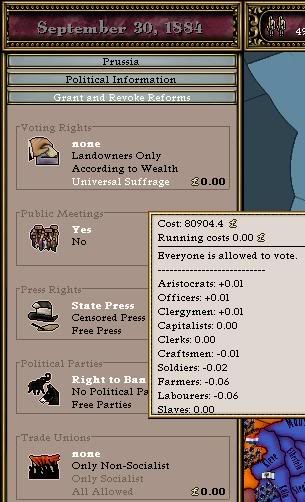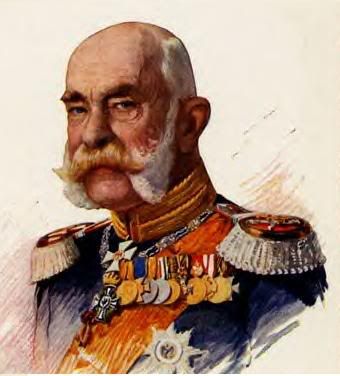For the past three days, reports had been reaching Vienna – the seat of Habsburg power – that demonstrations, riots and revolts were occurring here and there throughout the far-flung Austro-Hungarian Empire. The news of democratic reforms in Germany had set all of Austria’s constituent ethnicities to demanding the same. It wasn’t just the usual places. Poles had risen up in Przemyst and Tarnow, Ukrainians in Lemberg, and Slovenes in Laibach. There were violent protests not just in Budapest, but in Vienna and Graz. The news had stirred a long-dormant movement for independence in Croatia. And there were similar reports coming in from more remote locations. The people of Austria were abuzz. And all at once, this time – not as in the past. Not, at least, since 1867 when unrest had resulted in the weakening compromise that empowered the Hungarians at Austria’s expense.
“Father,” Archduke Rudolf addressed Emperor Franz Josef. “Kaiser Friedrich is recognizing the mood of his country. We must recognize our citizens’ mood. We…” His father was studiously ignoring him. Rudolf sighed. “At least we can offer more independence to satisfy the ethnic lands.”
“Why are you here?!” the Emperor asked his son, his moustache and sideburns shaking with vehemence. The 26-year-old archduke had every right, by protocol, to attend at court. But Franz Josef really had no interest in hearing his son’s liberal ideas. And his age didn’t lend much gravity to his opinions. How dare he! “There was no ‘mood’ to recognize until this happened!” On the other hand, Rudolf was the heir to the throne, and needed to be present at these difficult discussions. Franz Josef visibly halted his temper. “Forgive me, son.” He looked into the distance for a few counts. “You know I have tried to do so – to come to accommodation with our minorities – but the Hungarians will not allow it!”
“We could actively engage the Hungarians in helping us restore order,” War Minister Agaszy suggested. “It would strengthen our strongest link of empire while suppressing the weakest.”
Foreign Minister Thaunberg contested, “They would ask a price – yet another – and our empire would be weaker in the long run.”
Franz Josef sighed with frustration and shook his head. “Our government is a Frankenstein.”
The archduke nodded agreement. “And, if I don’t miss my guess, we may see the same end.” He ignored his father’s admonishing glance.
“All the more reason to use our military advantage and establish our authority, Mein Emperor.” Seeing his emperor unmoved, Agaszy struck off on a new tack. “If we can threaten an anti-socialist war against the Prussians – demand that they return to an absolute monarchy – then we could use the environment to stabilize and reform the Empire. Otherwise, I fear we are lost.”
“Minister, is that even realistic?” Thaunberg was accustomed to political battles with the War Minister. It was nice to have the Archduke’s support – such as it was – but he was not yet strong enough to take Agaszy on. “How would it be practical to demand of the Germans that they take back such a move? Moreover, how would we justify that to our own people? It would be impossible!”
“We could approach Tsar Alexander, and see if he would join us!”
“He would more likely take advantage of our weakness and try to rip our Slavic provinces from us.”
“Emperor,” Agaszy returned to the most pliable man in the room. “I must emphasize the importance of having a ready martial force. We must mobilize.”
“Father, I must express my extreme reservations about this.”
Agaszy had nothing more to say. All of the ministers awaited the Emperor’s response.
“I am not comfortable with this!” Franz Josef had rarely had the strength or inclination to make the hard decisions. “There are too many questions.”
“Emperor! If we do nothing, we are lost!”
“Do it!” Franz Josef stormed. “Mobilize the Army. If we can’t make a war, then perhaps they will save us from a civil war.”



